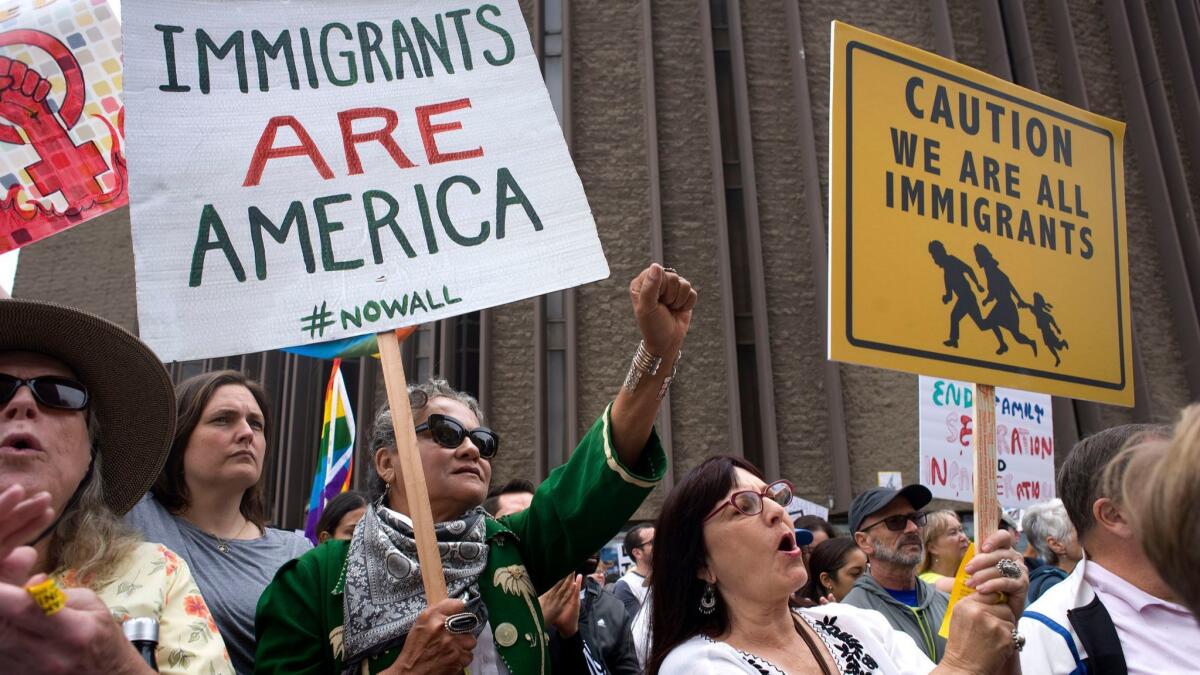Federal judge declines to ease deadlines for government to reunite separated families

- Share via
Reporting from SAN DIEGO — The court-imposed deadlines for the government to reunite families separated at the border will remain intact, although a federal judge acknowledged that they may need to be relaxed in some cases, including for the 19 parents who were deported without their toddler children.
More than a week into the massive effort to try to reconnect some 3,000 children with their parents, lawyers for the Department of Justice said Friday that it has dedicated “immense” resources to try to comply with the court’s June 26 order.
But the process that the U.S. Department of Health and Human Services has put into place to match up family members will take some time — perhaps longer than the deadline permits — if it is to comply with existing policies and procedures designed to protect children from human trafficking under law, the Justice Department argued.
The order gives the government until Tuesday to reunify children younger than 5 with their parents, and until July 26 for older children.
As many as 3,000 children remain separated from their parents, according to new estimates by HHS.
In a status conference Friday in San Diego, the Justice Department asked for clarification on how to proceed so it can either meet the deadlines or be excused from them.
U.S. District Judge Dana Sabraw was reluctant to extend the deadlines, instead urging the government to streamline processes where appropriate, “but of course never losing sight of the safety of the children,” he said.
The government also asked the judge to clarify whether the order applied to parents who have already been deported; the judge confirmed it did.
The most pressing work involves reunifying the youngest children with their parents, and Sabraw encouraged the government to make every effort possible to meet the Tuesday deadline while acknowledging that 100% compliance may be difficult, if not impossible, in some circumstances.
Justice Department attorney Sarah Fabian said so far, 86 parents have been matched to 83 children younger than 5. Of those parents, 46 are in immigration custody, 19 were released from immigration custody and 19 were removed from the U.S. without their children. Nine are believed to be in the custody of the U.S. Marshals Service.
Sixteen children believed to have been separated at the border have not yet been matched to parents.
Additionally, a background check on the 86 parents has revealed criminal histories of kidnapping/rape or child cruelty against two that make them unfit for reunification, Fabian said.
Lee Gelernt, an attorney for the American Civil Liberties Union, said advocacy groups are standing by to help locate missing parents to meet the deadline, even those who were removed and are now living in other countries.
“We will get as many lawyers as necessary to track those families down,” he promised.
The judge ordered the government to provide the ACLU with a list of names of parents of the youngest children by 5 p.m. Saturday so the renewed search effort can begin.
A declaration by an Immigration and Customs Enforcement official filed Friday said the young children who have been identified for reunification are detained in 23 different facilities across 13 states. ICE has so far flown 23 parents on commercial airlines to detention facilities closer to where their children are being housed to facilitate reunions.
Going forward, the Justice Department said that it intends to detain families together in immigration custody — a solution it argued complies with both Sabraw’s order as well as the Flores agreement, a court settlement that limits the amount of time children can be held in immigration detention.
When asked for clarification on this point, Sabraw agreed that nothing in his order takes away the government’s discretion to either detain or release parents in immigration custody; keeping families together is the key.
As to the first deadline under the court order — that all detained parents should be in communication with their separated children by Friday — the government said it has complied. To aid in the communications, the Justice Department said tablets have been distributed to detention centers for video chats.
Davis writes for the San Diego Union Tribune.
More to Read
Sign up for Essential California
The most important California stories and recommendations in your inbox every morning.
You may occasionally receive promotional content from the Los Angeles Times.













